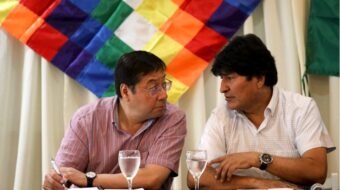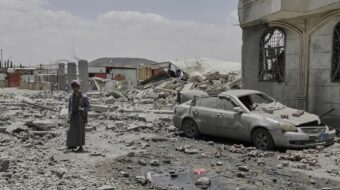Addressing Cuba’s National Assembly Aug. 1, President Raul Castro surveyed current problems and ideas for recovery. His comprehensive overview of points touched upon at government, Communist Party and commemorative meetings earlier in the week testified to an array of difficulties.
The “tense financial situation our economy is experiencing” dominated his discussion. Contributing factors included $10 billion in hurricane losses last year (20 percent of the GDP), reduced export and tourist income, debt obligations and difficulties securing loans. Economic growth projections for next year fell from six percent to 2.5 percent, and to 1.7 percent presently.
Shortages exist of workers, particularly construction workers, teachers, police officers and others “to do other work that requires particular dedication or physical effort.” Resources are wasted or stolen, especially electricity used in homes. Many social service expenditures are unnecessary, Castro suggested. He returned to earlier discussions of idle land and overdependence on food imports.
For Castro, solutions lie in cost-cutting, conservation and a new work ethic. “Nobody, no individual, no country, can indefinitely spend more than she or he earns.” He rejected deficit financing and advocated “growth in production and services that contribute hard currency income.” Spending for social services “should be in accordance with real possibilities, and that means cutting.”
Government agencies have been merged for efficiency and cost saving. A “Comptroller General of the Republic” has been established, charged with “oversight of all state and government bodies” and identifying both corruption and “negligent or criminal conduct.”
Postponed retirements and retirees’ returning to teaching will yield 19,000 additional teachers this year, Castro promised. He highlighted “suburban agriculture” in the hands of small farmers using local resources and draft animals. Trucks are being refurbished to move food from countryside to cities.
Citing “many university graduates in some specialties far over and above our necessities,” the president would “change mentalities” for the sake of a “skilled workforce.” Otherwise, “Who will attend to the land, who will work in the factories and workshops?”
Raul Castro reviewed Cuba’s place in the world, highlighting victory over U.S.-imposed isolation. He referred to leadership recently of the Non-Aligned Movement, participation in regional alliances, and diplomatic recognition by all Western Hemisphere nations save one.
Castro reiterated that Cuba was “ready to talk about everything” with Washington, but “not to negotiate our political and social system.” There would be no “shadow over our independence, sovereignty or self-determination.” He was reacting to U.S. Secretary of State Hillary Clinton’s suggestion earlier “about wanting to see fundamental changes in the Cuban regime.”
“They didn’t elect me president to restore capitalism in Cuba or to surrender the Revolution,” he pointed out. “I was elected to defend, maintain and continue perfecting socialism, not to destroy it.”
He did remind National Assembly delegates that “the economic, commercial and financial blockade remains intact and fully implemented.” Also, “Cuba continues to be unjustly included on the list of state sponsors of international terrorism.” The Obama administration got credit for resuming talks on migration issues after a six-year gap, for diminished “anti-Cuban rhetoric,” and for “positive but minimal measures” on Cuban-American visits to Cuba ― not yet implemented, he noted.
Observing that the seventh Communist Party Congress set for later this year had been postponed, Castro explained that economic problems have to be studied and solutions devised beforehand. Time was too short, he maintained, to allow for discussion by the Party and people. “It must be the people, with its Party in the vanguard, that decides,” he added.
It will be a “Herculean task” to devise recommendations for the next party congress. Under consideration is elimination of dual currencies, many free services, and “unjustified subsidies.” A new wage system will introduce pay “to each according to his labor.” Castro indicated that a “National Conference” will soon take place for adding new members to party leadership bodies and removing others.
President Castro expressed certainty that ideas behind Cuba’s Revolution, far from dying off with the older generation, live on with Cuban young people. He sent a “strong embrace to Gerardo, Ramón, Antonio, Fernando and René,” the Cuban Five antiterrorist fighters held in U.S. jails. “Their unbreakable determination [is] now a symbol of the Cuban Revolution.”









